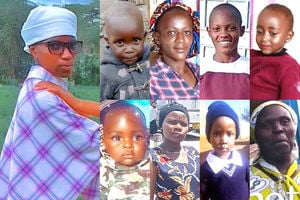Sleeping giant or paper tiger? Kenya mulls joint bid for 2027 Afcon with an eye on 2030 World Cup

Sports CS Ababu Namwamba (right) shares a word with Fifa Director Member Association Africa and former footballer Gelson Fernandes on January 9, 2023 during a press briefing at Maktaba kuu building, Nairobi.
What you need to know:
- Co-hosting Africa’s biggest football extravaganza stands to boost the country’s economy and sporting infrastructure, but skeptics feel Kenya which is the second largest economy in East Africa, would be punching below its weight, having earlier won the bid to host 1996 edition.
The Cabinet’s approval of Kenya to bid to host the 2027 Africa Cup of Nations (Afcon), alongside other East African nations was greeted with a mix of excitement and skepticism.
Excitement because of the many gains that comes with a country or city hosting Africa’s biggest football extravaganza.
Some of these include lots of entertainment to fans from the enthralling matches, fans getting the rare opportunity to see in real life some of the continent’s football stars, and boost to the infrastructure and economy of the host country.
Skepticism stemmed from the feeling that, in placing a joint bid for the tournament, Kenya which is the second largest economy in East Africa after Ethiopia, would be punching below its weight.
Even more, Kenya had been awarded and later on stripped of the hosting rights of the 1996 Afcon, and the 2018 African Nations Championship (CHAN) tournament. Some fans fear a repeat of this.
Many have been reluctant to celebrate Cabinet approval of the bid on December 6, arguing that the country has the capability to successfully host the coveted continental showpiece on her own.
“It (bidding to host the 2027 Afcon) is good but it would be prudent if Kenya went alone. That way, the country stands to gain a lot. The government has the capacity to meet all the requirements (by the Confederation of African Football - CAF) for Kenya to host the tournament,” former Football Kenya Federation (FKF) boss Sam Nyamweya said.
“It will have a positive impact on our Kenya’s ailing football industry. But again we cannot be sure until we see it happen and that will depend on the goodwill of the government because we all know what happened to us before,” said former Harambee Stars player Elijah Onsika.
Regional integration
Perhaps knowing too well that skeptics would castigate the planned joint bid, the Cabinet backed its approval by stating that co-hosting the tournament would go a long way in promoting the integration of East African Community.
“Cabinet noted that the joint bid (for 2027 Afcon) would deploy the power of sports in furthering regional integration," said the Cabinet in the December 6 dispatch.
Cabinet Secretary for Sports Ababu Namwamba said that apart from seeking to promote the integration of EAC through sports, the government’s plan to team up with other countries in the region for a joint bid to host the 2027 Afcon was necessitated by the poor state of Kenya’s sporting infrastructure, particularly lack of world-class stadiums.
But he added that all hope of Kenya bidding to host the championship alone is not lost, and that a final decision on the matter will be made after getting views from all the relevant stakeholders.
The government hopes that hosting the 2027 Afcon will come with requisite infrastructural development, and the soon-to-be-launched grassroots football development programme dubbed ‘Talanta Hela’ will yield the football talent to enable the national team to qualify for the 2030 Fifa World Cup.
According to CAF’s list of pre-approved stadiums for the 2022/23 inter-club football campaign that was released in August last year, Kenya, Burundi and South Sudan are the only EAC nations without at least one stadium cleared by the continental football governing body to host international matches.
St Mary’s Stadium (Uganda), Bahir Dar Stadium (Ethiopia), Stade du TP Mazembe and Complexe Omnisports Stade des Martyrs (Democratic Republic of Congo), Huye Stadium (Rwanda) and Tanzania’s Benjamin Mkapa National Stadium and Azam Complex are the arenas in the EAC that CAF then okayed to host the inter-club contests.
CAF had in October 2021 banned the iconic, 60,000-seater Moi International Sports Centre (MISC), Kasarani, and the 30,000-seater Nyayo National Stadium – Kenya’s two main arenas from hosting international matches after the two venues failed to meet the required standards.
Nyayo National Stadium was struck out of the list mainly due to lack of properly functioning floodlights, and a media centre.
Among other issues, the VVIP area at Nyayo National Stadium was also not up to standard. The continental football governing body directed that serious renovation be undertaken at MISC, Kasarani.
Solid plan
"We recommend that the renovation plan is based on modern architecture, contemporary design, and quality materials with a clear project plan and specific timelines.
In order for Caf to follow the progress of the renovation works, we ask your federation to provide an action plan with the tasks and deadlines for the completion of the works in the stadium," read part of CAF’s letter to FKF CEO Barry Otieno, which pointed out pitch surface, dressing rooms and toilets as some of the areas that were in dire need of renovation.
Veteran coaching instructor Bob Oyugi warns that it will be a big gamble if Kenya bids to host the 2027 Afcon alone due to lack of proper stadiums.
“With the tough economic times, do you think the government will set aside adequate funds for the renovation of enough stadiums to CAF’s required standards for it to host the tournament? the former Gor Mahia coach posed.
“I don’t think that will happen and we risk being stripped of the rights to host the competition should the bid be successful. Our neighbours have some good stadiums and if we team up with them, I believe the region can host a very successful Afcon,” said the former Gor Mahia coach.
Former CAF president Issa Hayatou had in 2017 revealed that Kenya was stripped of the rights to host the 1996 Afcon after the then President Daniel Moi wrote to him stating that the county was not ready to host the biennial competition.
South Africa hosted the competition and won it, while Kenya was banned from competing in the next two editions of the tournament.
Some reports indicated that Moi’s government was not willing to build new stadiums in Nairobi and Mombasa at the time on grounds that it would make the opposition popular among Kenyans.
FKF, then referred to as Kenya Football Federation, was headed by the late Joab Omino who was an outspoken opposition Member of Parliament.
Lack of proper stadiums again cost Kenya the rights to host the 2018 CHAN.
Former FKF Chief Executive Officer Herbert Mwachiro, who was part of the 2018 CHAN Bid Committee told Nation Sport that everything was ready for Kenya to host the competition, which was then estimated to cost about Sh7 billion, save for the stadiums.
MISC Kasarani, Nyayo National Stadium and Kinoru Stadium in Meru are the main venues the Bid Committee had identified to host the matches, with each being accompanied by two training grounds.
CAF's demands for any country hosting its matches are that the venues must be near an airport, level five hospital and a five- star hotel.
Kenya meets this requirement since MISC and Nyayo National Stadium are near Jomo Kenyatta International Airport while Kinoru Stadium is close to Isiolo International Airport.
Kipchoge Keino Stadium and 64 Stadium in Eldoret are close to Eldoret International Airport while Jomo Kenyatta International Stadium in Kisumu is near Kisumu International Airport.
But all the six stadiums will only be fit to host an international match if they are upgraded to the required CAF standards.
Namwamba has said that the government through its “Talanta Hela” project will this month reveal its plan for football infrastructure.
He said the government will only target a few stadiums to renovate or construct to the required international standards.
“Infrastructure development is a core part of the whole Talanta Hela programme and renaissance of our football and sports. The upgrading programme for our stadiums will not be the scattered, staccato, knee-jack and management by crisis-style infrastructural development like in the past, but a well thought-out plan.”
CAF also requires that for a country to host the Afcon, it must have hosted one of the continental junior championships.
In case of a joint bid, one of the countries in the bid must have hosted a junior championship. Only Rwanda has met this requirement in the region as it hosted the 2016 CHAN.
“It is important they (government) get the right people in place to push for Kenya's bid to host the Afcon. They need to plan early and well but I would insist that we try hosting CHAN before Afcon,” Mwachiro advised.Nyamweya says since 2027 Afcon is still far away, Kenya can still host one of the junior championships to qualify to host the Africa’s biggest football extravaganza.




